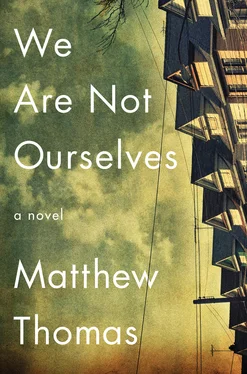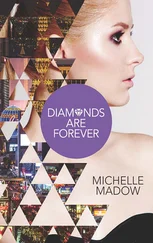• • •
A few months into the pregnancy, she suffered a miscarriage. The sadness she felt was ruinous, unspeakable. Almost worse was the awakening in her of a dormant foreboding that went back, perhaps, to her mother’s own miscarriage and the effect it had had on both their lives. She’d never acknowledged it consciously, but in the blind alleys of her mind she’d feared that if she ever did manage to get pregnant, she’d have difficulty bringing the child to term.
She tried not to let Ed see how distraught she was. She needed to keep him on task trying to get her pregnant again, and she didn’t want him thinking it would be gallant to take the pressure off her for a while. Another year passed with no results. She started having an extra glass of wine at restaurants. She took to suggesting wine with nearly every home-cooked meal. She began buying cases of wines she liked and storing them in the basement to have something on hand when company came over, and because buying in bulk was cheaper. She felt she was acquiring a little more insight into the way her mother’s life had played out. She was still in control, though; she kept going to work every day, kept depositing money into her savings account.
Ed no longer made efforts to reassure her. He seemed to have resigned himself to not having children. At times she wondered if he weren’t relieved. Despite his protests to the contrary she imagined he wouldn’t terribly mind preserving for himself some of the time that fatherhood would claim. Once, when he said he was too tired on a night they were scheduled to try, she accused him of sabotaging their plans. She knew she was being hysterical, but she couldn’t help herself.
Her friends ran into no trouble having babies. Cindy Coakley had three girls in five years until she finally delivered Shane to Jack. Marie Cudahy followed up Baby Steven with the twins, Carly and Savannah. Kelly Flanagan’s Eveline was born with a cleft lip, but then Henry came out a couple of years later looking like the Gerber baby. One after another, the calls came in with the cheerful news, and the cards arrived celebrating fecundity. The only holdout among her close friends was Ruth McGuire, who had raised the last two of her seven younger siblings herself. When Ruth told her she was done raising kids, Eileen felt herself drawing even closer to her. They would greet the childlessness together.
Whenever they gathered around to watch whichever of her friends’ kids was celebrating a birthday open presents, Eileen bit her nails down to the quick. She was sure everyone could read her thoughts in her mortified grin. She always spent too much money and bought too many gifts. She felt a nervous expectancy whenever the kid began to tear the paper open. She needed to have gotten the essential gift, the inevitable gift.
Having no kids freed Ed to pursue his professional interests without the burden of nighttime feedings or diaper changes or pediatric visits. He did important work on neurotransmitters, gave talks at conferences, and was named full professor faster than his peers.
She stopped thinking of each menstruation as a referendum on her femininity. She threw herself into her work with a compensatory vigor and was promoted several times. She sensed that her bosses and coworkers saw her as one of a new breed of women — it was 1975—willing to sacrifice motherhood on the altar of career. The men deferred to her and the mothers hated her, and there was an opportunity here if she was willing to pursue it fully.
Still, the miscarriage haunted her. She had dreams of sitting on the toilet bowl and hearing an unusual plop and finding in there a tiny baby who’d open its eyes at her — she couldn’t tell its sex — and look at her angrily, blinking slowly, and she would wake with a start and shake Ed awake. She avoided looking into the bowl when she went to the bathroom. Eventually, she and Ed settled into the rhythms of a childless life, which offered undeniable compensations: they could go out with other couples without having to arrange for child care; they could indulge in the leniency reserved for aunts and uncles; and they were free to nurture their careers in the way they might have nurtured offspring. Maybe this was why she was so upset when Ed was offered the chairmanship of the department and turned it down to devote more time to teaching and research. It was as if he was telling her he didn’t love their child.
• • •
To make up for the money he’d left on the table in passing up the chairmanship, Ed started teaching night anatomy classes at NYU. He’d pop home for dinner and head into the city by train. On dissection nights, he came home smelling like a pickled corpse himself. She couldn’t stand to have him touch her after he’d been handling dead bodies, and when he teasingly ran his hands over her anyway, she squealed and squirmed out of reach.
A tenure-track position opened in NYU’s biology department. One of Ed’s advisors was on the search committee. He said Ed would be given serious consideration if he applied.
She urged him to do it. NYU would be an obvious bump up in prestige.
“They need me at BCC,” he said. “Anyone can teach at NYU. What’s important to me is having my students leave knowing they got a real education. I want to help them get into NYU. I want them prepared to meet the demands that will be placed on them when they do.” There were other reasons to stay: the city had an airtight pension plan and great health benefits; there was no guarantee of tenure at NYU; he had a pretty good lab at BCC and could do the same research there that he’d do at NYU; there were grants out there to be procured. “It’s all about having the right ambition,” he said.
In the end, he never applied. To all the people she’d excitedly told about the NYU possibility, Eileen defended Ed’s choice by saying that when the opportunity arose, which was bound to be sooner rather than later, he would be a natural choice for dean of the college. That prospect, she said, wasn’t something you just flushed. That was the sort of career experience that could be parlayed into a parallel administrative position in a more prestigious institution.
He kept teaching the night classes. Now when he came home stinking of embalming fluids, not only wouldn’t she let him near her in bed, she made him shower before she’d even hug or kiss him hello. Dinner and dishes would intercede after that, and often she could get to bed without having to touch him at all. She didn’t feel bad withholding herself from him. He had made his choice. He shouldn’t have expected to have everything he wanted, not if she had to give so much up to keep him happy.
• • •
The tall tree in the backyard, whose crown eclipsed the apex of the Orlandos’ gabled roof, blocked much of the light in their bedroom. They were into their midthirties, and hints of seniority crept into their thoughts; they held them off by making love. Sometimes the activity was tinged by anger. Neither of them was going anywhere, even if in the middle of fights that lasted for days she entertained thoughts of divorce and suspected he did, though neither raised its specter aloud. They knew they would never sever their union, and this knowledge opened a door to the basement of their psyches. They became familiar enough to each other to begin to feel like strangers in bed, which infused their love life with a new potency. She wondered whether her friends had wandered down similar alleys, but she never had the courage to ask.
• • •
When she was thirty-five, after she’d long since given up worrying about it, she conceived a child and carried the pregnancy to term, delivering at dawn a couple of days before the ides of March, 1977. She and Ed had been struggling for weeks to come up with something to call the baby if it happened to be a boy, and by morning of the second day they were no closer to an answer, to the consternation of the girl with the birth certificate paperwork. Ruth took the train in to visit and accidentally left her book behind on the hospital nightstand. When the girl came around again on the morning of the third day and said Eileen could always take a trip down to City Hall to file the documents herself, Eileen’s gaze landed on the name of the author of Ruth’s book, Mrs. Bridge , which she had never heard of. She had a distant relative named Connell, but the real reason she chose it was that it sounded more like a last name than a first name, like one of those patrician monikers the doctors she worked for often bore, and she wanted to give the boy a head start on the concerns of life.
Читать дальше
Конец ознакомительного отрывка
Купить книгу












